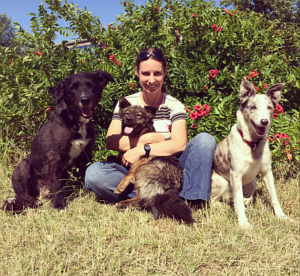Explore the fascinating world of canine genetics with our comprehensive 14-week course, designed for breeders, trainers, veterinarians, and dog enthusiasts.
Meet Your Lecturer

Science and dogs have been my main interests since my childhood.
However, I didn’t think about connecting these two sides of my life during my school years, mainly because I was unaware of such possibilities. „Dog science”, in its modern form, is a pretty young field.
I became a molecular biologist and, in parallel, learned more and more about dogs through self-education. During my university years, I had the opportunity to learn a little ethology from teachers of the Ethology Department at Eötvös Loránd University – the research team which has played a key role in establishing modern canine ethology. However, I continued my path towards molecular genetics and got BSc, MSc degrees and then a PhD (it was not as simple as it sounds in one sentence 😊).
Meanwhile, I continued my dog path, too: I did sports and training with my own dogs and found new connections with people who had similar interests. Consequently, I started to hold educational presentations about genetics for local dog breeders and owners. Suddenly, in 2016, I had the opportunity to join the Senior Family Dog Project at the Department of Ethology as a geneticist. Here, my dog-related scientific path has begun, and I gradually left behind the strictly molecular path. Through these years, I was part of a great team and really enjoyed the scientific world – well, most of it.
Gradually, I started to feel that I was more an educator person than a silent writer of Science papers, so I started to seek more opportunities in education.
Now, I mainly spend my time as a dog trainer – a possibly surprising change – but I would like to continue my genetics path by educating people. I believe that education is the fundament of a better future both for us and for our canine friends. Nowadays, there is increasing tension around pedigree dog breeding, which at least partly results from suboptimal breeding practices. Learning is infinite, and it is never a shame to discover and overcome old, failed concepts and theories if science has proven them wrong. With the advent of dog genomics, we can now get a glimpse into the molecular reality behind traits and diseases, and this step can revolutionise dog breeding – if breeders learn how to use the genomic tools and how to make better decisions in breeding. My dream is to build a community of dog enthusiasts who believe in science and cooperation because, as it will turn out during the course, cooperation is also a key component to preserving dog breeds.

A list of publications representing the dog genetics-related scientific work I have been involved in so far:
Jónás, D., Sándor, S., Tátrai, K., Egyed, B., and Kubinyi, E. (2020). A Preliminary Study to Investigate the Genetic Background of Longevity Based on Whole-Genome Sequence Data of Two Methuselah Dogs. Front. Genet. 11, 315. doi:10.3389/fgene.2020.00315.
Kubinyi, E., Bel Rhali, S., Sándor, S., Szabó, A., and Felföldi, T. (2020). Gut Microbiome Composition is Associated with Age and Memory Performance in Pet Dogs. Animals 10, 1488. doi:10.3390/ani10091488.
Sándor, S., Czeibert, K., Salamon, A., and Kubinyi, E. (2021a). Man’s best friend in life and death: scientific perspectives and challenges of dog brain banking. GeroScience 43, 1653–1668. doi:10.1007/s11357-021-00373-7.
Sándor, S., Jónás, D., Tátrai, K., Czeibert, K., and Kubinyi, E. (2022). Poly(A) RNA sequencing reveals age-related differences in the prefrontal cortex of dogs. GeroScience 44, 1269–1293. doi:10.1007/s11357-022-00533-3.
Sándor, S., and Kubinyi, E. (2019). Genetic pathways of aging and their relevance in the dog as a natural model of human aging. Front. Genet. 10, 948. doi:10.3389/fgene.2019.00948.
Sándor, S., Tátrai, K., Czeibert, K., Egyed, B., and Kubinyi, E. (2021b). CDKN2A gene expression as a potential aging biomarker in dogs. Front. Vet. Sci. 8, 348. doi:10.3389/FVETS.2021.660435.
Urfer, S. R., Darvas, M., Czeibert, K., Sándor, S., Promislow, D. E. L., Creevy, K. E., et al. (2021). Canine Cognitive Dysfunction (CCD) scores correlate with amyloid beta 42 levels in dog brain tissue. GeroScience 43, 2379–2386. doi:10.1007/s11357-021-00422-1.
The full list of publications can be accessed here.
How can you join?
The Canine Genetics Course is organised by Cynology for Everyone.
The registration for the Autumn 2025 is over. Future courses will be announced later.
Follow the Facebook page and Instagram account, or subscribe to the newsletter to catch up on news!
